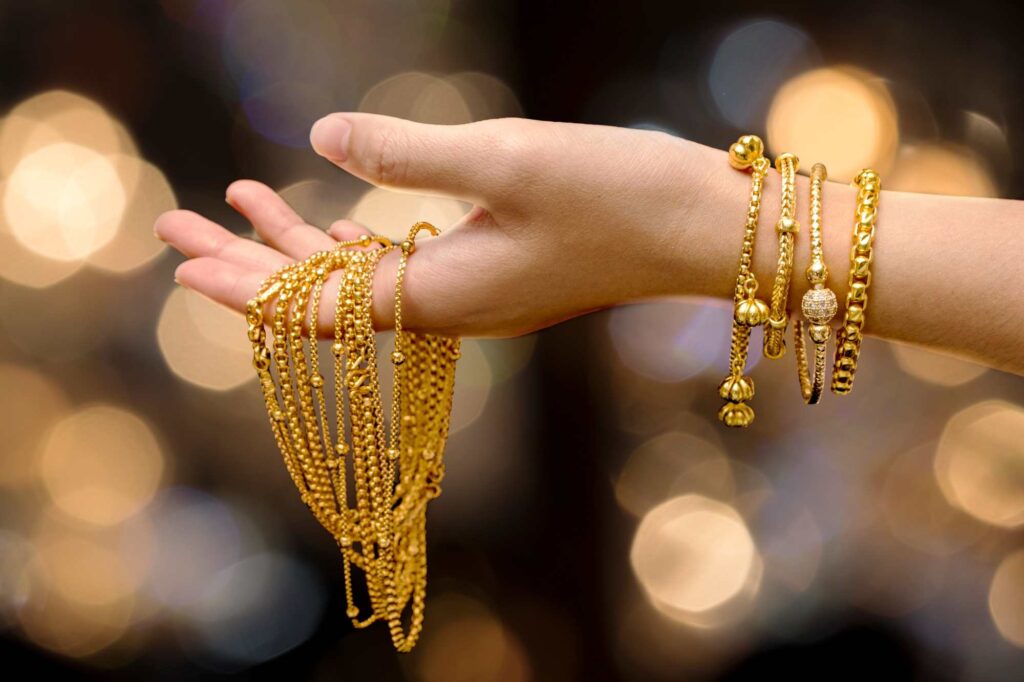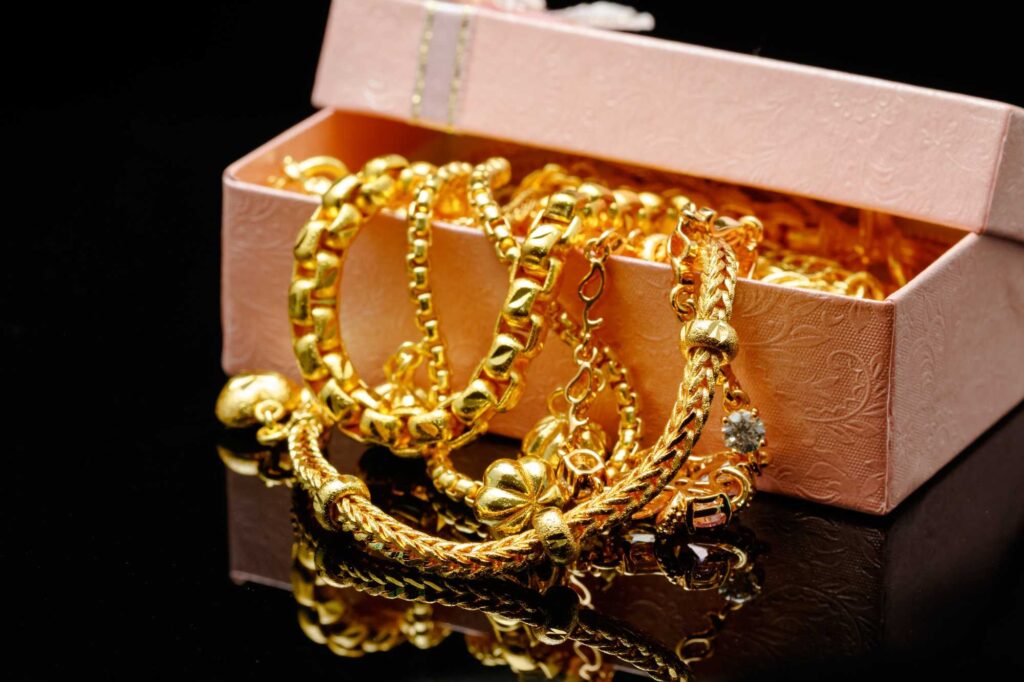CONTENTS

Finding jewelry that suits your skin type can be challenging, especially if you have sensitive skin that tends to react to certain metals commonly found in jewelry. However, by following a few useful tips and tricks, you can discover exquisite and fashionable jewelry that won’t trigger any irritation or discomfort.
This comprehensive guide offers practical advice and recommendations to help you locate the ideal jewelry for your sensitive skin, allowing you to appreciate the beauty and elegance of jewelry without worrying about any adverse reactions on your skin.
Jewelry and sensitive skin

Wearing jewelry and accessories can bring joy and allow for self-expression, but individuals with sensitive skin may experience discomfort and irritation as a result. Sensitive skin often reacts to the metals commonly used in jewelry, such as nickel, leading to symptoms like rashes, itching, and redness. This can be a significant concern for those who want to incorporate jewelry into their daily wear but wish to avoid any adverse skin reactions.
Understanding the causes of jewelry sensitivity and knowing how to select pieces that are suitable for sensitive skin is crucial. By opting for jewelry made from safe materials and seeking guidance from reputable jewelers in Arizona, you can enjoy wearing jewelry without experiencing any negative skin effects.
Allergic Reactions to Jewelry

Allergic reactions to jewelry are a common concern for many people, especially those with jewelry sensitivity. These reactions can range from mild itching and redness to severe rashes and blisters.
The most common cause of allergic reactions to jewelry is sensitivity to metals, particularly nickel, which is often found in inexpensive jewelry. Allergic reactions can also be caused by other substances used in jewelry making, such as chemicals and dyes.
To avoid these reactions, it is essential to choose jewelry made from hypoallergenic materials, such as stainless steel, titanium, or gold. It is also important to consider the type of metal used in the jewelry and to avoid jewelry that contains nickel or other irritants.
By being mindful of the materials used in jewelry and choosing carefully, those with sensitive skin can enjoy wearing jewelry without any negative side effects.
What Makes Jewelry Hypoallergenic?

Hypoallergenic jewelry is crafted without the use of nickel or other metals known to cause skin irritation, making it an ideal choice for individuals with jewelry sensitivity. High-quality jewelry often features precious metals like platinum, tungsten, cobalt, and palladium, which are less likely to trigger adverse skin reactions.
In contrast, costume jewelry is frequently constructed from nickel-based base metals, making it less suitable for those with sensitive skin.
For optimal comfort and safety, it is advisable to seek out jewelry crafted from hypoallergenic materials. Our selection includes a wide range of styles, from wedding rings to necklaces, bracelets, earrings, and more, all designed with materials that are gentle on sensitive skin.
Testing for Jewelry Sensitivity on Your Skin

To ascertain whether you have a sensitivity or allergy to the metals used in jewelry, it may be worthwhile to consult a dermatologist for a skin test. One common method for testing skin allergies and dermatitis is the patch test, which involves applying different extracts known to cause dermatitis to the skin as patches and monitoring the area for 48 hours.
Alternatively, if you wish to bypass a doctor’s appointment, you can conduct your own assessment by wearing a piece of jewelry continuously for several days or by using a home test kit.
Which Metals are Common Irritants for People with Sensitive Skin?

Common irritants for people with sensitive skin in jewelry include:
- Nickel
- Copper
- Brass
- Cobalt
- Aluminum
Costume jewelry often contains these metals, and their inclusion can lead to skin reactions like itching, redness, and rashes in individuals with jewelry sensitivity. Those with sensitive skin should steer clear of jewelry crafted from these metals or opt for pieces coated with hypoallergenic materials to reduce the risk of skin irritation.
The Best Metals for Sensitive Skin Jewelry

The best metals for sensitive skin jewelry are:
- Stainless Steel
- Titanium
- Gold (14k or higher) or pure gold
- Platinum
- Palladium
- Sterling silver jewelry
These metals are renowned for their hypoallergenic qualities and are less prone to trigger skin reactions, itching, or irritation in individuals with jewelry sensitivity compared to other commonly used metals in jewelry production. When selecting jewelry, it’s essential to seek out pieces crafted from top-notch materials and hypoallergenic metals to guarantee the utmost comfort and safety for your skin.
What To Do If You Are Allergic To Metal Jewelry?

If you have an allergy to metal jewelry, here are some strategies to help you alleviate your symptoms:
- Identify the source of your allergy: Undergo a skin test to pinpoint the specific metal or metal alloy responsible for your reaction.
- Avoid the allergic metal: Once you’ve determined the metal causing your allergy, steer clear of jewelry made from that metal.
- Opt for hypoallergenic jewelry: Select jewelry crafted from hypoallergenic metals like stainless steel, titanium, 14k or higher gold, platinum, or palladium, as they are less likely to trigger skin reactions.
- Use a barrier cream: If you must wear metal jewelry, safeguard your skin by applying a barrier cream or lotion.
- Apply aloe vera: Aloe vera is an effective remedy for various skin allergies due to its astringent properties. Its antioxidants offer healing and soothing benefits, protecting the skin from irritants and promoting a smooth, soft texture.
- Avoid nickel-rich foods: Some foods, such as chocolate and nuts, contain elevated levels of nickel, which can induce allergies in highly sensitive individuals, including those with jewelry sensitivity. It’s advisable to refrain from consuming these foods to prevent exacerbating the allergy.
- Store jewelry properly: Properly maintaining jewelry can also minimize the risk of allergies. Keep metal jewelry in a clean, dry location, and prevent exposure to water and chemicals.
- Consult a dermatologist: If your symptoms persist despite these measures, consult a dermatologist for a thorough evaluation and treatment.
By following these steps, you can effectively manage your metal allergy and enjoy wearing jewelry without discomfort.
Frequently Asked Questions
What is jewelry for sensitive skin?
Jewelry for sensitive skin is specifically designed to minimize skin reactions and irritation. It is typically made from hypoallergenic materials such as stainless steel, titanium, higher-karat gold (e.g., 14k or higher), platinum, or palladium, which are less likely to trigger allergies or skin sensitivities.
How can I tell if a piece of jewelry is hypoallergenic?
To ascertain whether a piece of jewelry is hypoallergenic and suitable for those with jewelry sensitivity, one can seek jewelry crafted from materials like stainless steel, titanium, gold (14k or higher), platinum, or palladium. It’s also advisable to review the product description or packaging for information on the jewelry’s composition. When in doubt, consulting a dermatologist is a wise choice.
Is 14k or 18k gold better for sensitive skin?
Both 14k and 18k gold can be suitable for sensitive skin, but 14k gold is generally recommended as the safer choice. This is because 14k gold contains a lower percentage of other metals, like nickel or copper, which can trigger allergies. The higher the gold content, the less likely it is to cause a reaction.
Therefore, 14k gold, with its 58.5% gold content, is considered a better option for those with jewelry sensitivity compared to 18k gold, which has a 75% gold content. Nevertheless, it’s advisable to consult a dermatologist for personalized guidance and to ensure the best protection for your skin.
Conclusion
Finding comfortable and stylish jewelry for sensitive skin can be challenging. However, selecting hypoallergenic materials like sterling silver, titanium, and platinum while avoiding nickel and other irritants ensures your jewelry won’t cause skin irritation.
Also, considering the design of the jewelry, such as avoiding rough edges and sharp points, can minimize discomfort. With these guidelines, you can confidently choose jewelry that is both beautiful and gentle on your skin.


